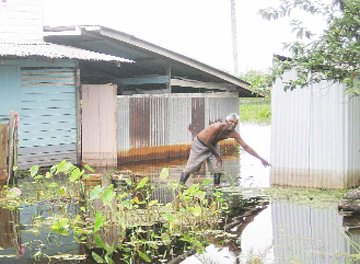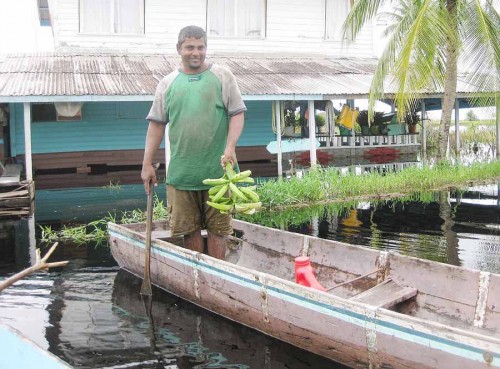Floodwaters in the Mahaica Creek rose again by two inches yesterday following heavy rainfall after having receded by about a foot last week, which had led residents to believe that their misery would soon end.

They told Stabroek News during a visit to the creek yesterday that while they would be glad for assistance to get “back on the crop” when the water receded, their immediate concern was to get “food to survive.”
The residents have already lost their cash crops and said their savings which they have had to resort to using for their survival were “running low.” They had received hampers from the government and two organisations so far as well as cleaning agents from the Civil Defence Commission.
Speaking on behalf of the farmers, Naresh Bhagwandeo, a rice and cash crop farmer of Big Biaboo told this newspaper that that they are grateful for the help received so far.
He said that while residents – who earn a living mainly from cash crop farming – do not like to “beg” for assistance they are “glad for anything right now.”
Bhagwandeo said that with the rainfall continuing from yesterday after a break of almost two weeks and with the water rising again, “farmers would take a longer time to get back on the land.”
He said most of the farmers had invested all of their money into the last crop and hardly had any savings when the floods came and took it all away. He made an appeal for other agencies to assist the farmers as they go through “this difficult period.”
Heera Parsram, who had also lost his crop, told this newspaper that “because the water gone down on the East Coast people think that everything ok in the creek. I don’t know when this place would dry out fuh we plant again.”
According to Chabraj Ramdeen, “The water big and all me garden duck out. Right now we need foodstuff in here because all wat we had gon soon done. Me don’t even have money fuh start me crop again and me glad if me can get some assistance.”
The man said that the government should grant all the farmers compensation because it was the government that opened the Maduni and Lama sluices and drowned their crops.
Aladin Hussain of Little Biaboo was distressed that he had lost his rice as well as his cash crop including bora, tomato, ochro and red beans.
The man who built a makeshift bridge to his front stairs to avoid going into the floodwaters said it was not easy to invest his money and see it go down the drain. He said too that the water had gotten into his kitchen in the lower flat and he has had to relocate his stove and utensils upstairs.
A single-parent, Subadrie Ramkarran said she had cultivated bora, saime, corilla, pepper and watermelon and “everything done; nothing nah save.” The woman related that she had “three stages of bora.”
Asked what she would do now she responded, “Me just gat to relax meself home until de wuk start again.” She said she has to use money from her savings so she and her son, Navindra who assists with the garden, could survive.
Further, she said “when that finish by de grace of God the flood gone done.” Her father, 71-year-old Ramkarran of Grass Hook who had gone to her visit her at her Little Biaboo home said he too lost his produce. He said it was hard for him to get by now. Reetlall Parsooram of Little Biaboo is among the many anxious farmers waiting to return to the land, but said “up to now nothing doing at the farm” which was still covered with knee-high water.
Also a poultry farmer, he said he has had to lift his chicken pens on top of his tables to keep them out of the water. He said government shared out feed to the farmers twice but only for sheep, goats and cows.
He was told that there was no feed for poultry and he did not think that was fair. “Them animal that can find grass; the chickens can’t eat grass so we shoulda get feed fuh dem too. The chickens starving and soon dem might start eating one another.”

He noted that he was not earning and the foodstuff he received from the government and the organizations helped a lot. He said that was almost finished and he catches fish to make meals some days.
Parsooram said that only the rice farmers have been given fuel to pump water out of their fields. He feels cash crop farmer should also benefit from fuel because they also have to use fuel to plough their land.
He said at the moment government is paying for secondary schools students to attend school because parents did not have enough money to send them. However, he said they are finding it difficult to send their children who are at the primary level to school as well. He said a women’s group assisted with the payments for transportation for a short time.
He said Minister of Agriculture Robert Persaud had suggested that parents half of the children’s transportation costs and government would pay the other half. However he is asking if the government can pay for the Grade Six students until they write their exams in April.
Cash crop farmer, Mahadeo Udai said he had lost all his produce as well as one of his 12 sheep. He pointed out that he received one bag of wheat bran and one bag of rice bran. He has also received hampers twice and last week he received another hamper from the Civil Defence Committee which consisted of bleach, disinfectant, mosquito repellant, toilet paper and a medicine for his “ground itch.”
Other cash crop farmers: Elvis Hussain and Ramnarine Bissoondyal have also lost their produce and were worried about getting money to reinvest in the crops.
Hussain had picked his green tomatoes from his trees before the water destroyed them. He said he left the tomatoes for about one month and had to throw them away because they had started to rot.
Bissoondyal said that he has to “mek much wid wah we gat and when that done we gat to bear we chafe. Things really rough now.” He had started to reap his boulanger and saime before the floods came.
This newspaper caught up with cattle and cash crop farmer, Marcellos Sarju as he was returning home in his canoe after checking his cows in the backdam. He said that the “cows punishing bad; them look weak, especially the older ones.”
He said the cows were surviving by staying on the “floating pagass [grass]” and were swimming in the water to get grass. He said he heard that the vets had been in the area but they did not go down to Grass Hook to check the animals there.
He had also dropped into his farm and barely managed to reap a “fine bunch plantain” and had picked up a few dried coconuts to cook with.





